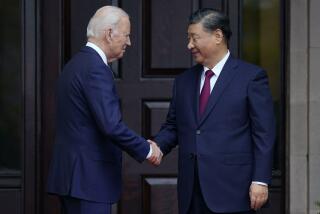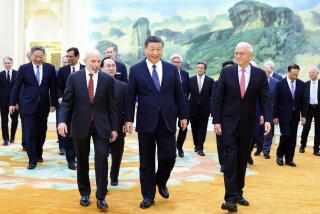Praise, Protest Greet Chinese Premier
- Share via
Touching down in the United States on the first stop of his American tour, Chinese Premier Zhu Rongji breezed through his introduction to Los Angeles’ political and business leadership Tuesday, deflecting a host of troublesome topics with his trademark wit.
Regarding American complaints about China’s abuse of human rights, Zhu said it would take too long to talk about them in a short meeting. A full discussion, he said, required going back to Rousseau and international human rights declarations. On the topic of trade relations between the United States and China, Zhu said the imbalance actually might work toward America’s interests, but added he would explain that later in his trip, when he visits the Massachusetts Institute of Technology.
“This speech of mine might not be able to win me a doctor’s degree,” he said of the upcoming MIT address, “but I hope it will win me the understanding of the American people.”
And on what may be the most politically charged topic of the moment between the two nations--allegations that China stole American nuclear secrets from the Los Alamos nuclear weapons lab--Zhu managed a smile and a laugh.
Zhu said his lunch companion, Los Angeles first lady Nancy Daly Riordan, had asked him what the Chinese government planned to do to celebrate the 50th anniversary of the Communist revolution. “I said there would be a very grand troop review,” Zhu began, adding quickly that the weapons displayed “would be developed by China itself, not stolen from the United States.”
The mayor’s wife, he said, proposed stamping the weapons with signs that read, “Made in China, not USA.”
“Good idea,” Zhu said.
The mixed Chinese and American audience laughed loudly at Zhu’s remarks, delivered without notes or prepared text. He then graciously toasted Riordan and the other guests.
At first, it appeared the day had the potential to deliver a low point in Sino-Southern California relations: A hard, cold rain fell at Los Angeles International Airport as Zhu’s plane arrived; two busloads of Chinese Americans on hand for the greeting had to be unloaded and reloaded to get them inside the back gate to the airport; protesters complaining about Chinese aggressiveness toward Taiwan and its occupation of Tibet braved the rain to wage a spirited demonstration over Zhu’s visit.
Gov. Gray Davis blamed the rain for missing an airport reception for Zhu that he was scheduled to attend. Later, however, the governor and the Chinese premier met privately for about 25 minutes in a suite at the Century Plaza.
Davis told Zhu he hoped to encourage more trade by opening a California office in Shanghai this fall, said press secretary Michael Bustamante. He said the governor also registered his concern with Zhu about human rights in China as well as trade policies that are hurting U.S. products.
When Zhu finally made it to the luncheon in his honor--an event that started more than an hour late because American dignitaries kept the Chinese premier waiting--he was toasted by an affable mayor whose fluency did not quite match his guest’s. Riordan proclaimed that it was his “great honor to visit a great leader of the world,” although it was Zhu doing the visiting. Then he thanked Zhu for his warm welcome last year in China, although Zhu was unable to meet with Riordan then.
Riordan also gushed with praise for the Chinese premier, the second-ranking leader of the world’s largest Communist country and one that recently has been implicated not only in attempts to steal American nuclear secrets but also with an effort to try to buy influence in the 1996 American presidential campaign.
“We love you,” the Los Angeles mayor announced. “We love your country.”
Some audience members puzzled over Riordan’s effusiveness, which contrasted with the protests outside on behalf of Taiwan and Tibet.
China has threatened to use military force against Taiwan--which it considers a renegade province--if it ever declares independence. The situation in Tibet is even worse, said Tseten Phanucharas, one of the organizers of the protest and the Southern California Coalition to Save Tibet.
But even as the protesters urged American disengagement with China, Chinese and American officials were reporting progress in the opposite direction.
Senior U.S. and Chinese trade negotiators met intermittently Tuesday in Washington and planned further meetings today to hammer out a deal that would allow China access to the World Trade Organization.
“We have substantially narrowed our differences, but there are critical issues on the table,” said Jay Ziegler, spokesman for U.S. Trade Representative Charlene Barshefsky.
He said it was “an open question” whether an accord could be finalized before Zhu meets President Clinton at the White House on Thursday morning or they hold a news conference that afternoon.
Times staff writers Bob Drogin and Dave Lesher contributed to this article.
More to Read
Get the L.A. Times Politics newsletter
Deeply reported insights into legislation, politics and policy from Sacramento, Washington and beyond. In your inbox twice per week.
You may occasionally receive promotional content from the Los Angeles Times.











